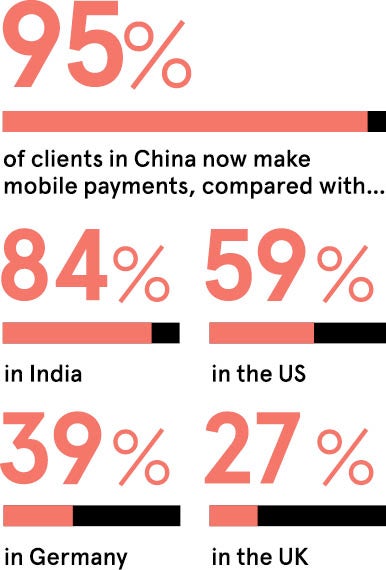Executives face being unable to calculate the full cost of business trips, left open to fraud or unable to reclaim domestic taxes, such as VAT, by not adopting a joined-up payment system for corporate travel.
That’s the warning from travel payment group AirPlus International, which is seeing increasing numbers of companies embrace invisible or mobile and virtual payments.
Invisible payments are already widely used by consumers, but research from AirPlus International suggests this trend is becoming the norm in corporate payments too.
The company is overhauling its entire infrastracture in anticipation of this surge from corporate travel managers, following a huge rise in demand globally.
According to the company’s 2018 International Travel Management Study, 95 per cent of clients in China now make mobile payments, compared with 84 per cent in India and 59 per cent in the United States. The company’s research also found that virtual payments were growing in Europe, with 39 per cent of respondents now making mobile payments in Germany and 27 per cent in the UK.

Paul Spelman, managing director of AirPlus International in the UK and Ireland, says the company has responded to the widespread adoption of virtual payments with its A.I.D.A. virtual payment solution.
“A.I.D.A. has become one of our most compelling products. It is a virtual payment card for corporate travellers that runs on the Mastercard platform,” he says.
This virtual card allows businesses to generate a unique virtual card for each trip, reducing the risk of fraud and giving complete oversight of all expenses during the trip.
Of course, AirPlus International’s service goes beyond purely offering a virtual payment card. It runs centralised company accounts on behalf of companies for big-ticket items, such as airline tickets, to enable businesses to keep travel spending within corporate policies and fully integrated within their expense systems.
According to the company study, 20 per cent of companies surveyed said they have implemented end-to-end mobility, where employee spend is automatically tracked and logged on the central company account system.
Mr Spelman says that companies should expect invisible payments to become mainstream for all aspects of business travel.
“Whether dining in a restaurant (dine+go), taking a taxi (myTaxi) or leaving a parking lot (Corporate Parking), invisible payment will become the norm, all without the use of physical cards,” he says.
The study shows that the use of virtual cards is growing rapidly, with worldwide use now at 16 per cent. But some are yet to embrace the technology.
For those companies that still have a preference for physical plastic, AirPlus International’s award-winning UK Corporate Card offering is set to expand to a pan-European programme from September. The launch will start in France and roll out to 19 countries over the following 18 months. This plastic card is to be issued in eight currencies including sterling and euros.
We saw increased demand from our customers to deliver more innovative products across our global footprint
Asked what was the ultimate trigger for the company deciding to begin a business transformation programme, Mr Spelman says: “It was a simple matter of timing. We saw increased demand from our customers to deliver more innovative products across our global footprint.
“To enable faster, more streamlined services, AirPlus International is embarking on the biggest, innovative transformation in the company’s history.
“We need to be able to adapt and change, and we are doing that based on technology designed for the future,bringing agile working to our business and to meet all the trends we have seen globally.”
For more information please visit airplus.com



